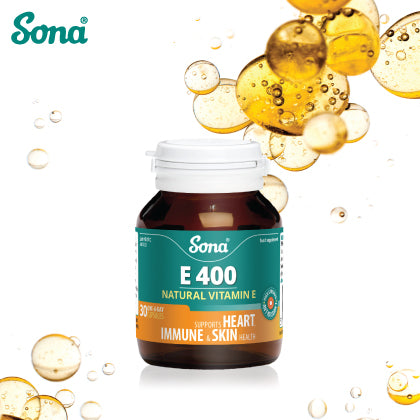
What is Vitamin E?
Vitamin E, also referred to as tocopherol or alpha-tocopherol, is a type of fat-soluble vitamin. Fat-soluble vitamins refer to vitamins that are absorbed along with fats in the diet and can be stored in the body's fatty tissue.
Why do we need Vitamin E?
Vitamin E also works as a powerful antioxidant. Vitamin E is a potent antioxidant. Antioxidants are compounds that help prevent cell damage caused by free radicals (unstable atoms that can damage cells). They do this by neutralizing the free radicals by sacrificing some of their own electrons (a negatively charged subatomic particle). This process naturally switches off a free radical, breaking a chain reaction that can affect other molecules in the cell as well as other cells within the body.
Clinical Considerations
Research has shown that vitamin E has been beneficial in treating certain conditions, including Alzheimer’s disease, liver disease, and preeclampsia.
- Alzheimer’s disease: High-dose vitamin E has been demonstrated in certain studies to slow the progression of Alzheimer's disease in individuals with mild to moderate Alzheimer's disease.
- Liver disease: Studies have shown that vitamin E can potentially improve symptoms of nonalcoholic fatty liver disease. However, some evidence suggests that taking vitamin E orally for two years for this reason is connected to insulin resistance.
- Preeclampsia: Increasing your vitamin E consumption hasn't been demonstrated to help avoid this blood pressure-related pregnancy problem.
Vitamin E also has potential in easing osteoarthrosis symptoms, managing diabetes, as well as being beneficial for the skin.
Vitamin E in our diet
Vitamin E can be naturally found in some foods. This includes vegetable oils (wheat germ, sunflower, safflower, corn, soybean oil), nuts (almonds, peanuts, hazelnuts), seeds (sunflower seeds), as well as green leafy vegetables (spinach, broccoli). Vitamin E can also be added to certain foods, such as, breakfast cereals, fruit juices, margarine, and spreads.
Supplementing can be very beneficial for those who are not getting enough food containing vitamin E in their diet from food.
Sona E400 provides 400IU of natural vitamin E per capsule, providing all of your daily vitamin E requirements.
References
- Encyclopedia, M., & E, V. (2021). Vitamin E: MedlinePlus Medical Encyclopedia. Retrieved 22 August 2021, from https://medlineplus.gov/ency/article/002406.htm.
- Harris, P., Quaife, M., & Swanson, W. (1950). Vitamin E Content of Foods. The Journal Of Nutrition, 40(3), 367-381. doi: 10.1093/jn/40.3.367.
- Rizvi, S., Raza, S. T., Ahmed, F., Ahmad, A., Abbas, S., & Mahdi, F. (2014). The role of vitamin e in human health and some diseases. Sultan Qaboos University medical journal, 14(2), e157–e165.
- Wilson, D., Nash, P., Buttar, H., Griffiths, K., Singh, R., & De Meester, F. et al. (2017). The Role of Food Antioxidants, Benefits of Functional Foods, and Influence of Feeding Habits on the Health of the Older Person: An Overview. Antioxidants, 6(4), 81. doi: 10.3390/antiox6040081.
- Vitamin E. (2021). Retrieved 22 August 2021, from https://www.mayoclinic.org/drugs-supplements-vitamin-e/art-20364144.
